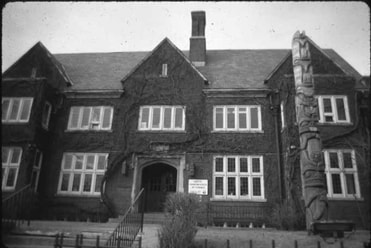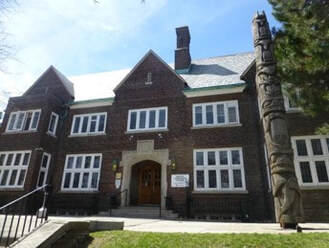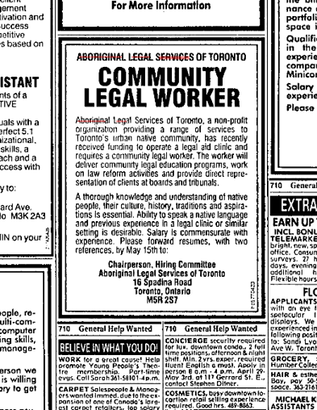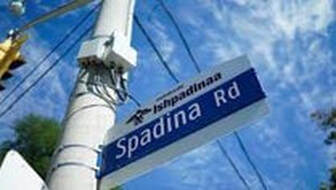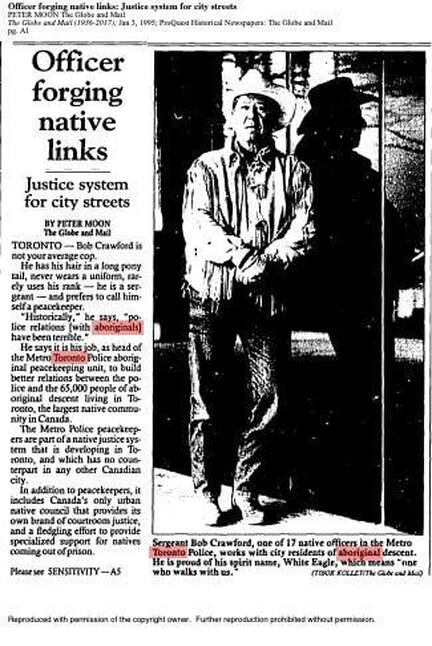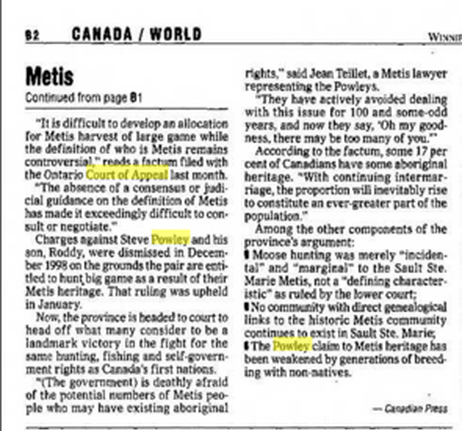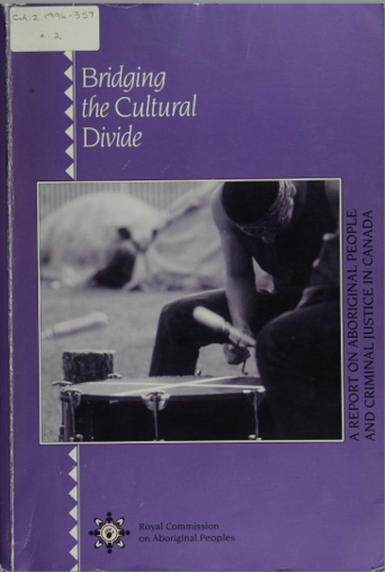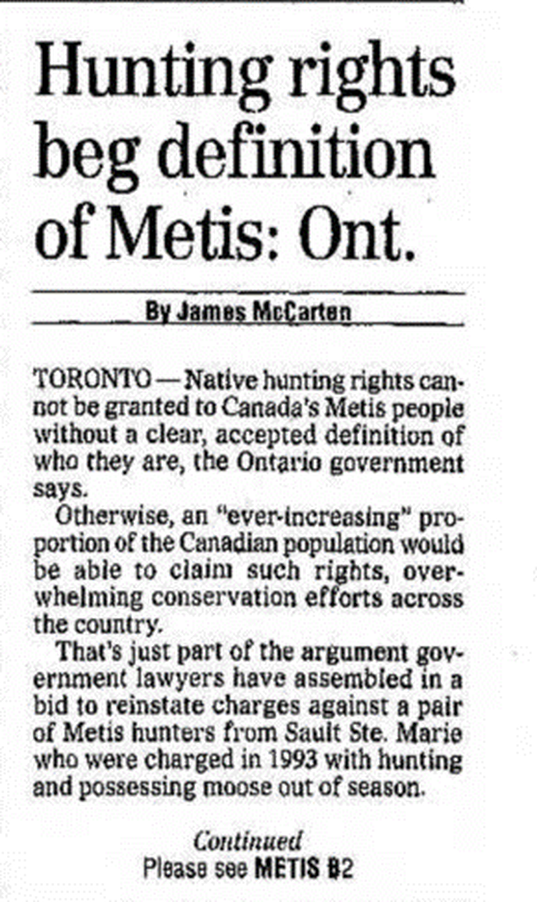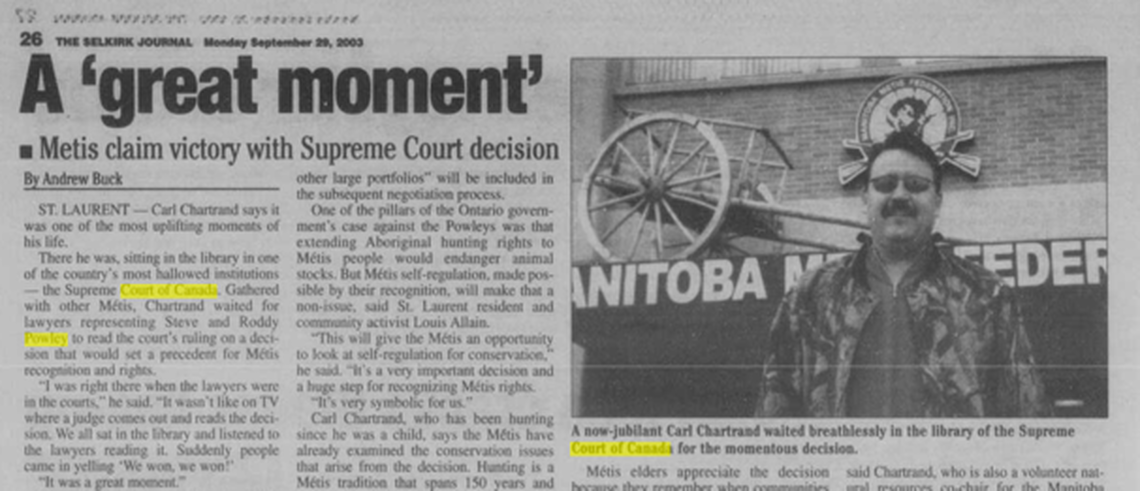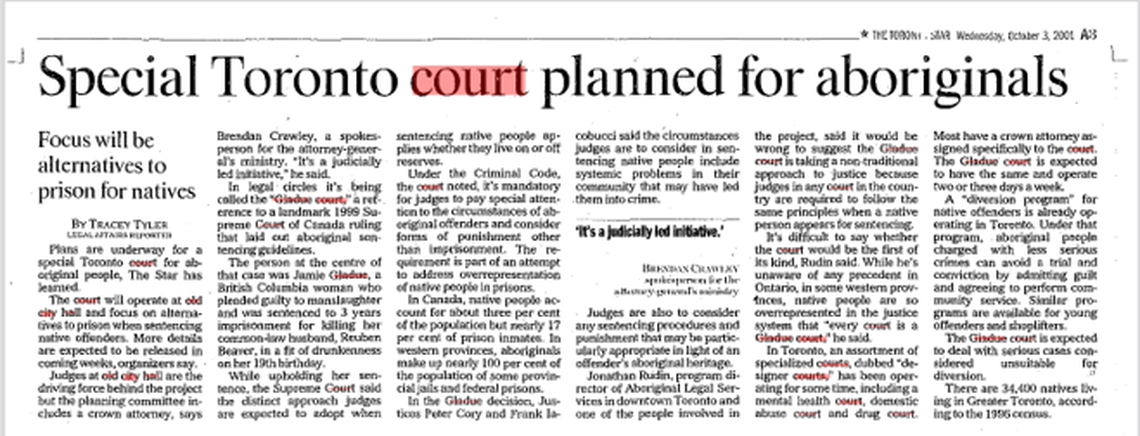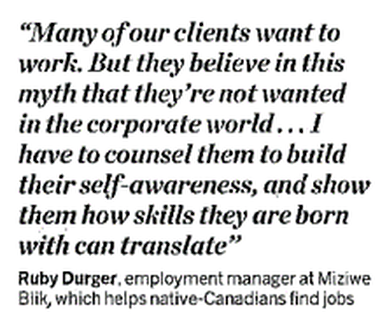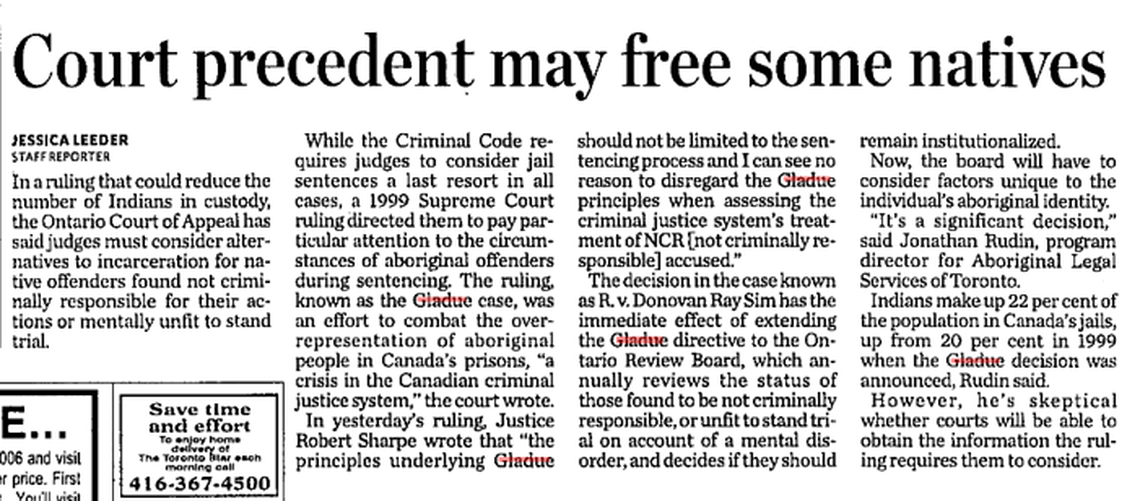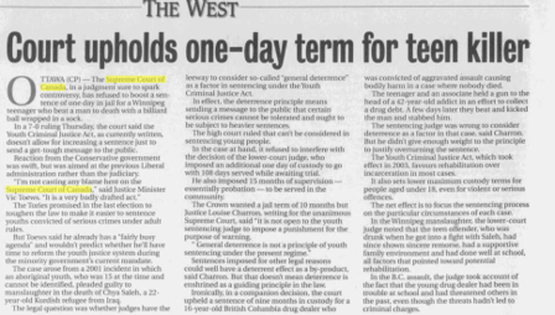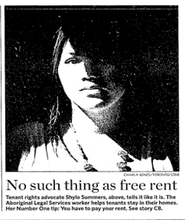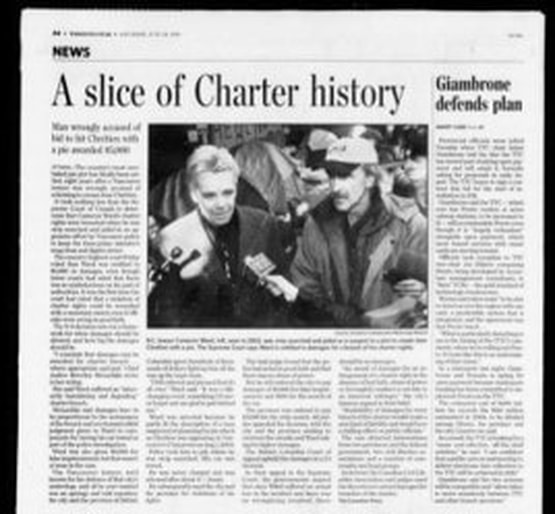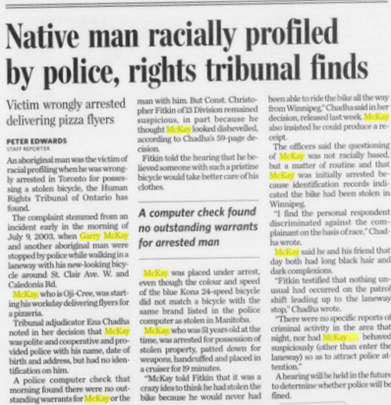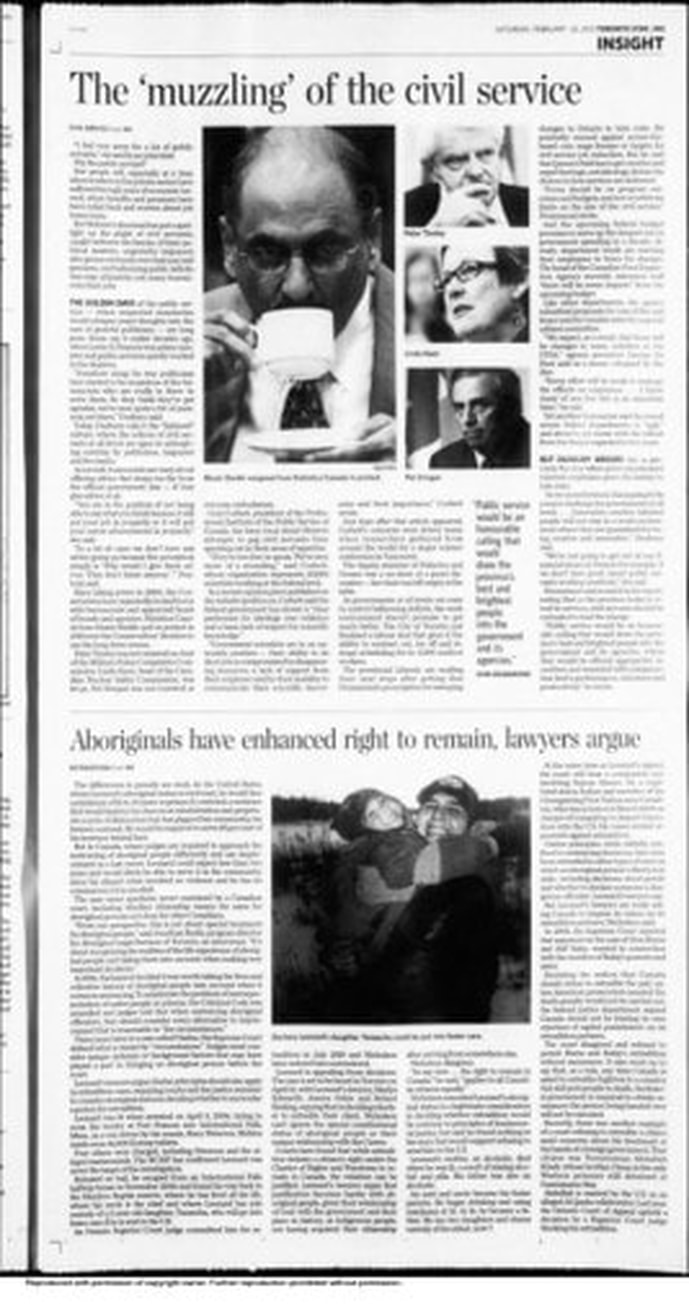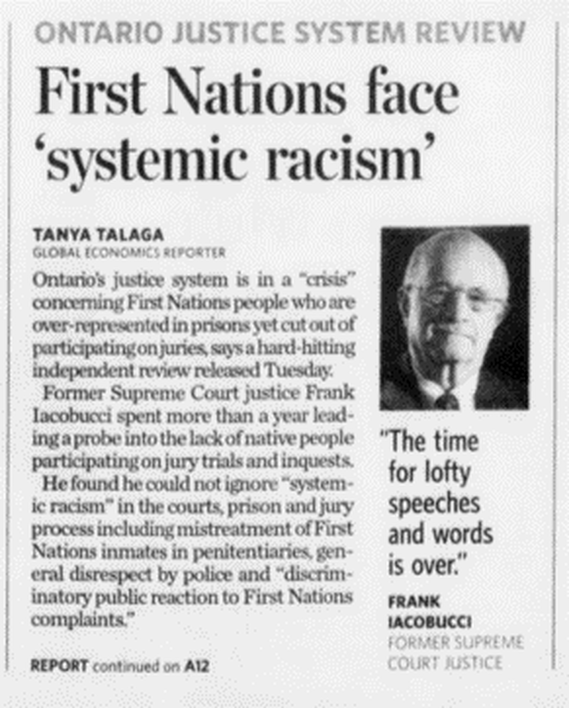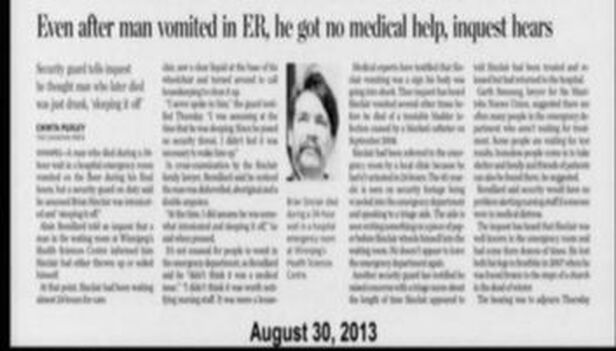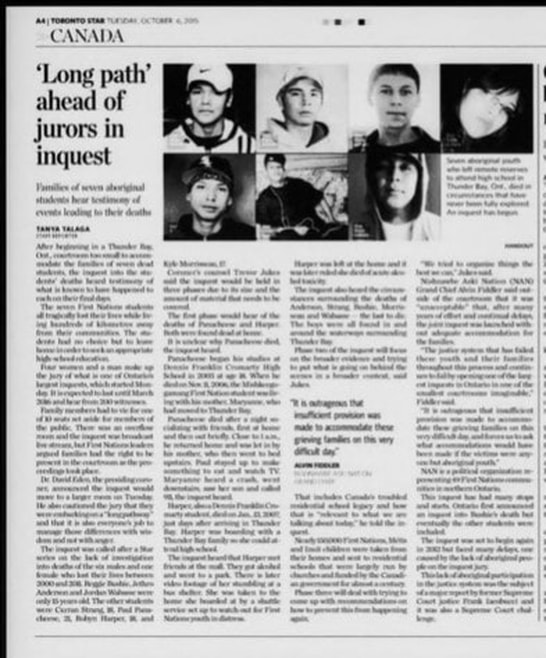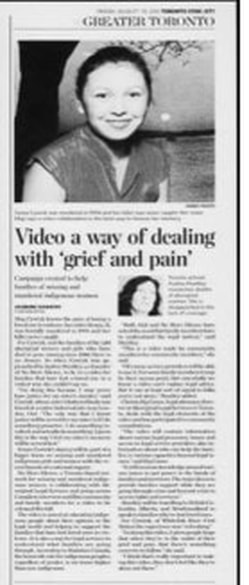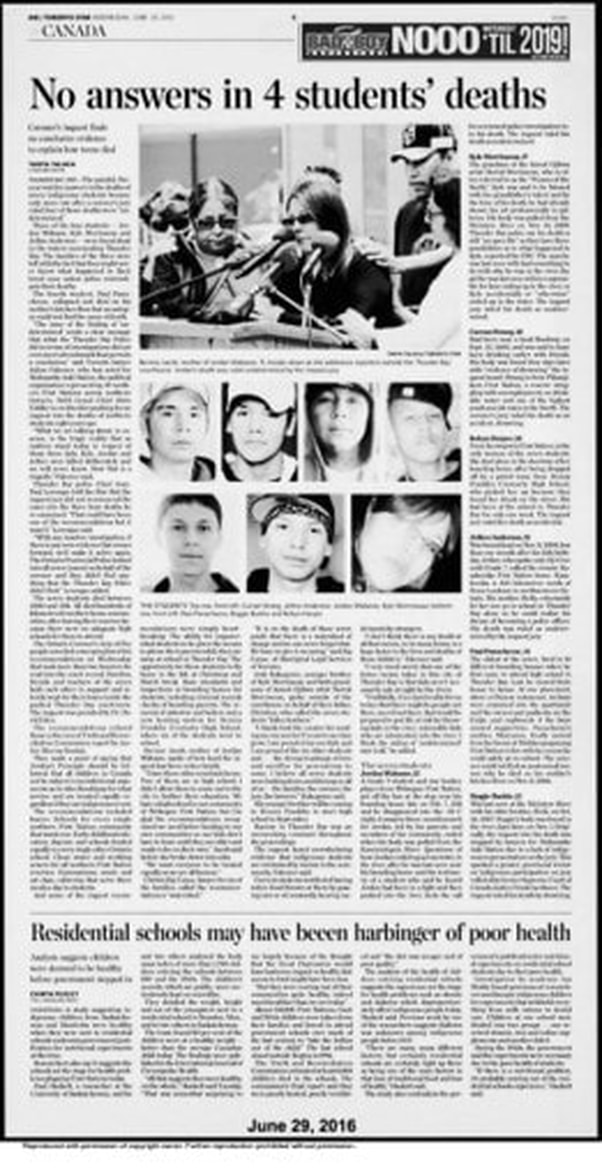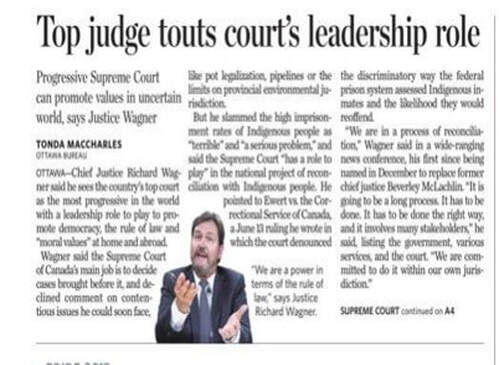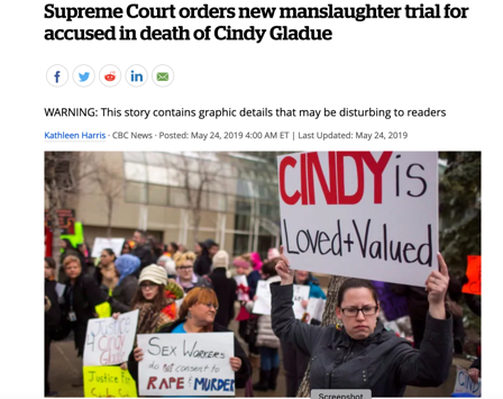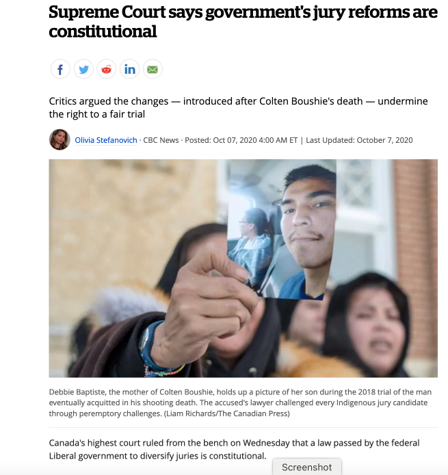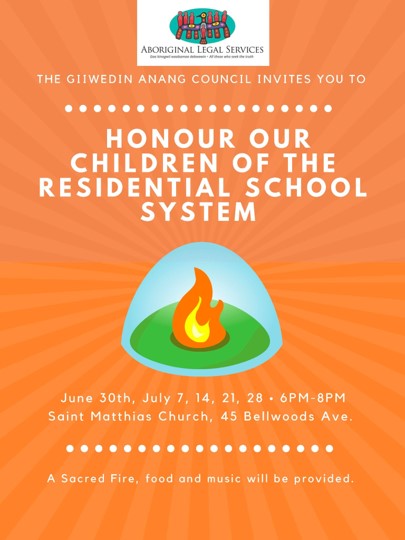1990
ALST formed – Offices at the Native Canadian Centre
One of the first board members of the organization was named Mark Stevenson, who worked for the Ontario Native Affairs Secretariat, in 1990, Aboriginal Legal Services was created as a spin off of the Native Canadian Centre of Toronto (NCCT). NCCT had some legal programs which ALST took over while originally having an office in NCCT. Mike Sherry, Murray Klippenstein, Grant Wedge, and Wanda Whitebird and Carol Montgagnes were the founding board of directors of ALST. Gayle Mason was the Executive Director of the NCCT and Alfred Eli was the President of the Board of the NCCT at the time.
1991
|
Gathering of Elders and Traditional Teachers to give guidance on the development of the Community Council program
Although nearly half of Indigenous Peoples in Canada live in urban areas, most Indigenous justice initiatives are designed for people living on reserves or in rural communities. Toronto, home to more than 40,000 Indigenous People in 1991, hosted the only urban Aboriginal Justice Program in Canada - Aboriginal Legal Services of Toronto's (ALST) Community Council. ALST is a comprehensive one-stop legal services centre for Indigenous Peoples. In July of 1991, more than 20 elders, traditional teachers, and faith keepers met in Toronto to discuss, among other things, the community council project. It was the consensus of this gathering that a smaller group should gather for a few days to consider the project in greater detail. The second gathering took place on 27-30 August 1991 on Birch Island. The gathering envisaged a process very different from that of the criminal courts: At the heart of the Community Council must be a real, conscious feeling of kindness and respect for both the offender and the victim. When the offender and victim realize that the Council members actually care about them and respect them, then the message of the Council has a better chance of getting through. |
1992
First Community Council Hearing
|
Following the eleven-month development phase, the program began hearing cases in March 1992. To the end of the month of December 1994, the program had heard 214 cases. In the 1993/94 fiscal year, the program heard 115 cases.
Non-compliance with council decisions was only 13.9 per cent. It should also be noted that many of those who do not comply fully with the council decision comply with a portion of it; very few people attend a council hearing and simply walk away with no intention of doing any of what they have agreed to do. ALST Moves Offices ALST moves to 197 Spadina Ave. |
1993Aboriginal Justice Counsellor Training Program to train Indigenous Peoples to work in the courts and Corrections.
2003ALS intervenes in R v Powley at the Supreme Court
In 2003, ALS intervened in the case of R v. Powley at the Supreme Court and the Ontario Court of Appeal. This case was the first major case to consider Indigenous rights for Metis Peoples. The case established that Metis hunting rights are in fact protected by s.35 of the Constitution Act. The case resulted in the ‘Powely Test’ being established which identified a set of criteria to define Metis rights and to define who is entitled to the rights identified. |
1997
|
2004
Gladue program expands in Toronto and also to Brantford-Hamilton
A proposal for funding was submitted to Legal Aid Ontario in 2004 to expand the Gladue program in both Toronto and Brantford-Hamilton. The proposal requested funding for two additional Gladue caseworker positions – the two new positions would allow for caseworker support to be provided to offenders not being processed through Old City Hall.
This resulted in a pilot Gladue Caseworker Program in non-Gladue courts in both Toronto and Hamilton-Brantford in the Fall of 2004.
A proposal for funding was submitted to Legal Aid Ontario in 2004 to expand the Gladue program in both Toronto and Brantford-Hamilton. The proposal requested funding for two additional Gladue caseworker positions – the two new positions would allow for caseworker support to be provided to offenders not being processed through Old City Hall.
This resulted in a pilot Gladue Caseworker Program in non-Gladue courts in both Toronto and Hamilton-Brantford in the Fall of 2004.
|
|
Gladue Aftercare Workers
Through funding received from Miziwe Biik, the position of Gladue Aftercare Worker was created. The Worker assists offenders in carrying out the conditions of the Gladue Sentence by providing support to connect clients with contacts and required services. This position was created as a result of a recognized need to provide support to clients after a Gladue Report is completed. 2005Gladue Court opens at 1000 Finch
The planning for the Gladue Court at 1000 Finch began in the late fall of 2005. The Court began its operations in January 2006 sitting on Mondays, taking cases from 2201 Finch. Soon after, the planning for the College Park Court |
2006
|
Gladue Court opens at College Park
Between January and March 2006, discussions and planning for the College Park Gladue Court took place. The Court began operating in June 2006, this was the third Gladue Court to be implemented. ALS intervenes in R v BWP – case establishes that general deterrence has no role in the sentencing of young offenders Jonathan Rudin and Kimberly R. Murray acted as Interveners in the case of R v. BWP. This case involved a young Indigenous offender and two appeals were raised questioning whether general deterrence can be considered a factor in sentencing a young offender. This case confirmed that deterrence does not have a role in the sentencing of young offenders. |
2007
2010
|
ALS intervenes in Vancouver (City) v Ward, [2010] 2 SCR 28 The case establishes that criminal trial courts can order financial damages be paid to people who are wrongfully arrested ALS co-hosts Second National Conference on Aboriginal Justice Post- Gladue Family Community Council Program received its Ojibwa name- Giiwedin Anang- translated as North Star. The name was given to the program in a ceremony conducted by Jake Agoneh and the name was feasted at an event at the Native Canadian Centre. The name was given by Traditional Healer Jake Ago Neh, in the winter of 2009-2010. Giiwedin Anang translates to North Star and Jake explained that once the north star was found, one was no longer lost. This council acts as the North Star to guide children and families to a resolution. ALS had Received its Anishinaabemowin name: Gaa kina gwii waabamaa debwewin. |
2011
2012ALS intervenes in R. v. Ipeelee, 2012 SCC 13 which affirms and strengthens the principles from R. v. Gladue.
ALS intervenes at the Ontario Court of Appeal in United States v. Leonard, 2012 ONCA 622 which extended the reach of Gladue principles to the extradition context. Aboriginal Youth Court begins at 311 Jarvis. |
2013Release of First Nations Representation on Ontario Juries, Report of the Independent Review Conducted by The Honourable Frank Iacobucci (which ALS called for and then made submissions to). ALS Clinic adds a tenant rights paralegal to its team. ALS intervenes in Wood v. Schaeffer, 2013 SCC 71 at the Supreme Court about how the rules in place after a police officer fatally shoots someone have to protect the public interest over the private interests of the officer.
ALS intervenes in Canada (Attorney General) v. Bedford, 2013 SCC 72, urging the court to consider the safety and circumstances of Indigenous people who engage in survival sex work. Healthy Relationships – Dreams From Growing children program launched as part of Giiwedin Anang. ALS co-hosts Fourth National Conference on Aboriginal Justice Post- Gladue and Ipeelee. 2014ALS, along with other legal clinics and the St. Michael’s hospital Family Health Team developed a medical-legal partnership called the Health Justice Initiative.
ALS participates in the inquest into the Death of Brian Sinclair at the Health Sciences Center in Winnipeg. ALS’ focus is systemic anti-Indigenous racism in healthcare. The work at the inquest led to the creation of the Sinclair Working Group which has held public forums and written op-eds. ALS intervenes in R. v. Anderson, 2014 SCC 41 about the role of Gladue in cases with mandatory minimums. Expansion of Gladue program to Ottawa, Barrie and Oshawa/Peterborough/Lindsay. Indigenous Persons Court starts in Brantford. |
2015Name change from Aboriginal Legal Services of Toronto to Aboriginal Legal Services.
Move from 415 Yonge to 211 Yonge. MOU with Australia’s Victorian Aboriginal Legal Services (VALS). ALS intervenes in R. v. Kokopenace, 2015 SCC 28 about First Nation representation on juries. Gladue program expands to Sudbury, Sault Ste. Marie, North Bay and Windsor. ALS co-hosts Fifth National Conference on Aboriginal Justice Post- Gladue and Ipeelee. Inquest into the Deaths of Seven First Nations Youth begins in Thunder Bay – ALS represents six of the families. 2017 |
2016ALS made submissions to the United Nations Committee on the Elimination of Discrimination against Women in Geneva about Canada’s actions in relation to Indigenous women.
ALS secured funding from MAG IJD for a Victim Rights caseworker. R v Hamidreza Safarzadeh-Markhali, 2016 SCC 14 where the Supreme Court struck down reductions on credit for time-served for people on bail. ALS with MAG hosts a Gladue Summit in Thunder Bay. Honouring His Honor Dinner for Justice Patrick Sheppard. Inquest into the Deaths of Seven First Nations Youth concludes with 145 recommendations from the jury. Gladue Caseworker program expansion: Gladue Caseworker positions (formerly known as Aftercare Workers) added in Sarnia, Waterloo-Wellington and another position in the Brantford region. Funding was obtained for three new programs – Traditional Teacher, FASD Worker, and Yoha:te Ne Khansen:Na (The Road To Your Name) program.
ALS Co-hosts Sixth National Conference on Aboriginal Justice Post- Gladue and Ipeelee. Release of First Nations Youth Inquest Year One Report Card. Gladue Caseworker program expansion: Gladue Caseworker positions added in Toronto, Windsor, Barrie, Durham, Ottawa, Sudbury, Sault Ste. Marie, and North Bay. A Gladue Caseworker in now in place in every region where there is a Gladue Writer with ALS. ALS produces Not Just Another Case – a video for families dealing with someone who is murdered or missing. |
2018
ALS intervenes in Ewert v. Canada, 2018 SCC 30 which held that the assessment tools used with Indigenous offenders is contrary to the Corrections and Conditional Release Act.
The Gladue Program signs a Memorandum of Understanding (MOU) with the Ontario Parole Board (OPB) to establish a framework for facilitating the provision of Gladue-relevant information by ALS to the OPB for consideration of Gladue principles in conditional release proceedings, as well as the participation of ALS Caseworkers, where appropriate, in OPB proceedings involved Indigenous applicants.
The Gladue Program signs a Memorandum of Understanding (MOU) with the Ontario Parole Board (OPB) to establish a framework for facilitating the provision of Gladue-relevant information by ALS to the OPB for consideration of Gladue principles in conditional release proceedings, as well as the participation of ALS Caseworkers, where appropriate, in OPB proceedings involved Indigenous applicants.
|
ALS intervenes in Canada (Canadian Human Rights Commission) v. Canada (Attorney General), 2018 SCC 31 about whether discrimination cases arising from the Indian Act can be heard at the federal Human Rights Tribunal.
ALS intervenes in R. v. Boudreault, 2018 SCC 58 which held that the mandatory victim fine surcharge is unconstitutional. ALS participates as a party with standing at the National Inquiry into Missing and Murdered Indigenous Women and Girls. ALS releases Communicating Effectively With Indigenous Clients a booklet to help lawyers understand how to work better with their clients. Honouring His Honour Dinner for Justice Harry LaForme. Release of First Nations Youth Inquest Year Two Report Card. |
2019
|
ALS co-hosts Seventh National Conference on Aboriginal Justice Post- Gladue and Ipeelee.
Release of First Nations Youth Inquest Year Three Report Card. Giiwedin Anang hosts a Round Dance. ALS intervenes in R. v. Barton, 2019 SCC 33 to ensure that the court considers the experiences of Indigenous women who are victims of violence, like Cindy Gladue in this case. ALS intervenes in R. v. Bird, 2019 SCC 7 4 about the role of Gladue and s. 7 of the Charter in Parole Board decisions about long-term offenders. ALS was awarded an Ontario Arts Council Grant to facilitate healing circles and workshops focused on traditional arts and crafts and spiritual practices. |
2020
|
ALS shows leadership during COVID-19 pandemic, working with other Indigenous agencies to help community members with food and basic needs and getting involved in cases and initiatives to ensure protections for people in homeless shelters and prisons and successfully advocating to end the ability of police to access a person’s COVID-19 status.
Release of First Nations Youth Inquest Year Four Report Card. ALS intervenes in R v Sharma at the Ontario Court of Appeal (ALS appeared at the Superior Court as well) – Court strikes down restrictions on access to conditional sentences because they violate the equality rights and fundamental freedoms of Indigenous people loin this. ALS intervenes in R v Chouhan at the Supreme Court which upholds the elimination of peremptory challenges. ASL intervenes in R v Turtle at the Ontario Court of Justice which finds that the unavailability of intermittent sentences violates the equality rights of First Nations residents of remote First Nations. |

